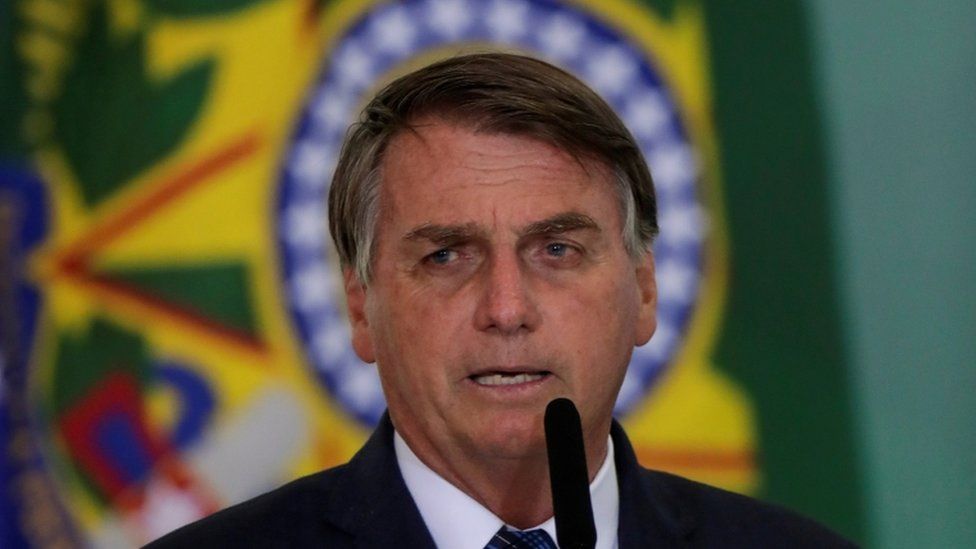Covid: Bolsonaro tells Brazilians to ‘stop whining’ as deaths spike
- Published

President Jair Bolsonaro has told Brazilians to "stop whining" about Covid-19, as he criticised measures to curb the virus despite a surge in cases and deaths.
His comments came a day after Brazil saw a record rise in deaths over a 24-hour period.
Brazil is facing its worst phase of the pandemic yet, leaving its health system in crisis.
In response some cities and states have imposed their own restrictions.
Brazil's health ministry says more than 260,000 people have died with Covid-19, the second-highest pandemic death toll in the world after the US.
On Thursday, another 1,699 deaths were added to that tally, a slight decrease on Wednesday's record 1,910. Meanwhile, a further 75,102 cases of coronavirus were reported, the second-highest daily rise on record.
The explosion of cases has been attributed to the spread of a highly contagious variant of the virus thought to have originated in the Amazon city of Manaus.
Yet on Thursday Mr Bolsonaro continued to downplay the threat posed by the virus.
"Stop whining. How long are you going to keep crying about it?" Mr Bolsonaro said at an event. "How much longer will you stay at home and close everything? No one can stand it anymore. We regret the deaths, again, but we need a solution."
What reaction has there been to President Bolsonaro's comments?
The comments were met with a furious response from São Paulo's governor, João Doria, who has been particularly scathing of Mr Bolsonaro's handling of the pandemic.
Speaking to the BBC, Mr Doria called President Bolsonaro "a crazy guy" for attacking "governors and mayors who want to buy vaccines and help the country to end this pandemic".
"How can we face the problem, seeing people die every day? The health system in Brazil is on the verge of collapse," Mr Doria said.
Mr Doria described President Bolsonaro as "a crazy guy"
President Bolsonaro has consistently opposed quarantine measures introduced by governors, arguing that the collateral damage to the economy will be worse than the effects of the virus itself.
"Unfortunately, Brazil has to fight, at this moment, two viruses: the coronavirus and Bolsonaro virus. This is a sadness for the Brazilians," Mr Doria said.
What measures are cities and states introducing?
Concerned about the strain on hospitals, mayors and state governors have taken matters into their own hands in recent days.
Rio de Janeiro is the latest city to announce a partial lockdown, placing restrictions on bars, restaurants and beaches.
The measures, which will take effect on Friday for one week, will require bars and restaurants to shut early and suspend commercial activity on the city's famed beaches.
The measures come after São Paulo state - Brazil's largest, with 46 million people - declared a "code red" situation, ordering non-essential businesses closed for two weeks starting Saturday.
Frustrated state governors announced on Tuesday that they would join forces to buy vaccines directly from manufacturers rather than wait for the federal government to deliver them.
Brazil, the worst-affected country by Covid in Latin America, has lagged behind in its roll-out of Covid vaccines.
What do we know about the new variant?
Researchers from the University of São Paulo working with their colleagues at Imperial College London and Oxford University think that the second wave may be linked to the emergence of a new variant of coronavirus which has been traced to the city of Manaus.
The new variant, named P.1, was first detected in people who had travelled from Manaus to Japan in January. The researchers studying it think it first emerged in Manaus in early November and has been spreading there quickly since.
Their data - which is still preliminary - suggests that the P.1 variant could be up to twice as transmittable as the original version of the virus.
It also suggests that the new variant could evade immunity built up by having had the original version of Covid. They put the chance of reinfection at between 25% and 60%.
Manaus, in the Amazon region, was one of the hardest hit cities in the first wave of the pandemic.
It was expected that the people infected in the first wave would have acquired some degree of protection or immunity. And yet, the city has seen a second wave of infections.
Researchers think this may be because a new variant has emerged which may be evading immunity provided by past infections.
Related Topics
- Published12 June 2020
- Published5 July 2022
- Published2 March 2021